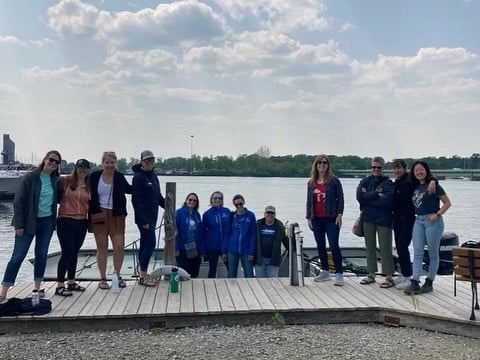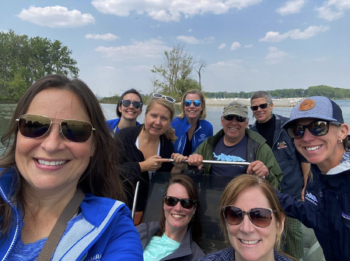Waterkeepers Meet in Detroit for Regional Summit
By: María Victoria Díaz-González

In early June, Great Lakes Waterkeepers gathered in Detroit, Michigan.
The Great Lakes Regional Summit drew 20 participants, representing four states and one Canadian province. Also in attendance were Waterkeeper Alliance Chief Finance and Operations Officer Rachel Cook, Senior Training Associate Gabrielle Segal and Organizer María Díaz-González.
The summit featured six training sessions, two strategic planning sessions and one field tour.
They [the presenters] all did a great job and were well prepared. In nearly 20 years, this was the most useful collection of sessions and topics I have experienced.
- Jill Jecklicka; Buffalo-Niagara Waterkeeper
Waterkeepers kicked off the first full day with three training sessions. The first focused on PFAS and was led by Dr. Tracie Baker (University of Florida) and Eric Moore (Michigan Department of Environment, Great Lakes and Energy). Dr. Baker presented on a study of emerging contaminants that her team conducted along the Lake Huron to Erie corridor. She laid out her team’s findings on the PFAS contamination found in the waters, sediment and fish tissue of the area. Eric Moore followed her presentation with a detailed explanation of the state of Michigan’s multi-pronged approach to identifying and addressing PFAS contamination. 
After lunch, Waterkeepers participated in an interactive JEDI session led by Alicia Hong (Swim Drink Fish Canada). Using an innovative polling software called Mentimeter, Alicia guided Waterkeepers through conversations on the challenges and strategies of engaging in JEDI work.
The last session of the day revolved around the citizen campaign to close down Line 5 — a 70-year-old crude oil pipeline that runs through some of the most vulnerable parts of the Great Lakes.
The second day was equally as full as the first.
In the first session, Waterkeepers met with representatives from two local foundations: Kimberley Gleffe of the Mott Foundation and Nat Lichten of the Erb Foundation. Waterkeepers learned about the funding priorities of each organization and engaged in productive conversation around issues like PFAS and the recent Sackett decision. The conversations continued as the group made its way to Grosse Ille for a riverside lunch. After lunch, the Detroit Riverkeeper Robert Burns took the group out onto the Detroit River for a tour of the habitat restoration projects his organization was leading.
We ended the summit with two more sessions.
The first was a collaborative roundtable with Laura Rubin of the Healing Our Waters Coalition. Waterkeepers spoke at length about the areas of overlap between their work and that of the Coalition. The last session of the day was an impactful exploration of the nuclear industry’s operations and impacts in the Great Lakes region. Presenter Kevin Kamps’ presentation clearly resonated as the summit came to a close.
Thank you to Detroit Riverkeeper and to our planning committee for such a special summit!